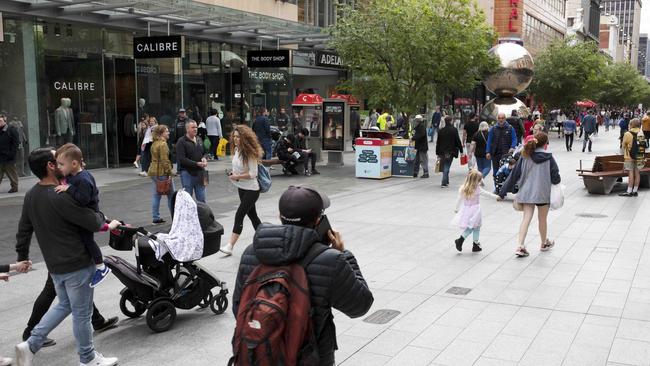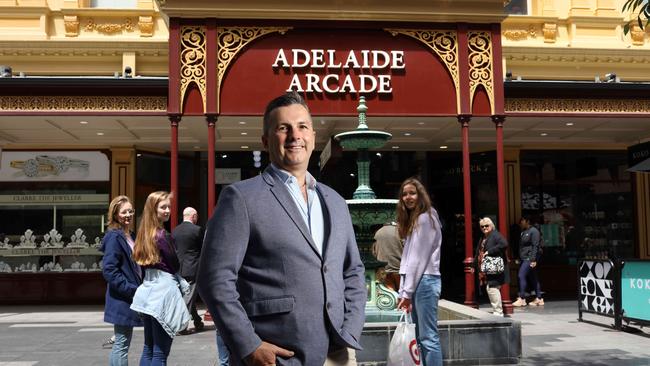Spending rising in Adelaide CBD as activity increases to levels not seen since COVID hit
People are coming back to the Adelaide CBD and spending is going back up – but a huge amount of city workers haven’t returned, meaning cafes are losing lots of money.
Business leaders have welcomed increased spending in the Adelaide CBD as the city steadily returns to levels of activity not seen before the pandemic.
Pedestrian traffic in Rundle Mall is the highest it has been since March, with electronic sensors recording thousands of shoppers passing them each day.
Almost all shops and small businesses along the Mall have reopened, including retailers in the adjacent Myer Centre, Adelaide Arcade and Regent Arcade.
Hospitality outlets such as food courts, bars and hotels also are open across the Adelaide CBD, with social distancing continuing to be observed.
Office workers regularly are gathering throughout the day and evenings at cafes and restaurants, especially those with al fresco dining.
Latest estimates put occupancy levels of city offices at 70 per cent compared with 10 per cent in Melbourne and 35 per cent in Sydney.
City carparks are now regularly filling again with commuter vehicles while trams, trains and buses to the CBD also have greater patronage.
However, major hotels are continuing to struggle because of the lack of domestic and international visitors.
Marketing campaigns have been launched to encourage more people to spend time in the CBD, including a voucher scheme that sold out within hours of its launch last Monday.
With the festive season approaching, the Adelaide City Council is spending $200,000 on an incentive scheme to encourage businesses and community organisations to have Christmas-themed displays, entertainment and activities.
Its offer of cheaper parking also has paid dividends, with operator UPark recording growing numbers of customers over the past two months.
Rundle Mall Management Authority general manager Johanna Williams said the Mall had progressively become busier as restrictions were eased, with 95 per cent of outlets now open.
“By early September, foot traffic reached 80 to 85 per cent of pre-pandemic levels,” she said.
“But it remains affected by city workers still based at home and fewer tourists and university students in the city.”

Lord Mayor Sandy Verschoor said it was vital more office workers continued to return to the CBD to help support city-based businesses.
“COVID-19 has had an enormous impact on businesses such as hospitality venues and retail stores, who rely on office workers buying coffees and lunches and shopping in their stores, as well as tourism, arts and entertainment.
“Encouraging office workers to safely return to the city is a hugely important part of the recovery effort as our city businesses really do need their support.”
Ms Verschoor said the council had spent $4 million on support packages and relief, including extra hardship assistance and grants for small businesses.
“Working with local business groups to develop, support and grow local businesses as we recover from the pandemic is our primary focus,” she said.
“Council will continue to do everything we can to help our city businesses continue to thrive despite the economic downturn brought on by COVID-19,” she said.
Australian Hotels Association (SA) chief executive Ian Horne said the reopening of the
Hilton Hotel last week and the launch of a new premium seafood restaurant, Fishbank, were “encouraging signs”.
Mr Horne said the SkyCity Casino expansion and the new five-star Crowne Hotel in Adelaide’s East End also were due to open next month, providing further optimism.
However, while occupancy rates in CBD hotels were around 25 to 35 per cent during weekends, they still remained too low during the weeks.
“Business people and people attending conventions traditionally have made up most of the visitors to Adelaide during the week who stay in hotels,” he said.
“The only long-term solution to this is to reopen our borders to both domestic and international visitors.”
Mr Horne said the hotel industry was being financially supported by the use of several hotels as quarantine facilities.
Property Council executive director Daniel Gannon repeated earlier calls that it was vital the remaining 30 per cent of city-based workers before COVID-19 struck returned.
Mr Gannon said it was employees within the private sector, rather than the public service, who were “dragging their feet”.
“The viability of our city and its businesses, cafes and restaurants is reliant upon all workers returning to their office workplace,” he said.
“A number of businesses that are based abroad or interstate are still maintaining ‘work from home’ policies without any consideration of our positive local circumstances which is hurting small business owners and deactivating the CBD.
“If business leaders don’t implore their people to return to the office, Adelaide’s CBD and South Australia’s economy will face a protracted period of pain.”
Mr Gannon said he was confident the Adelaide CBD was “heading the right way”.
“In recent weeks there has been a noticeable uplift in activity in restaurants and car park facilities,” he said.
“Hence, there is cause for optimism.”

It’s safe to come back, CBD workers
Adelaide Arcade general manager Andrew Jonats has seen his 70 tenants do it pretty tough over the past six months.
Mr Jonats moved quickly to give them rent relief when the pandemic first struck before seeing many having to temporarily close their shops through lack of business.
Most of that trade came from office workers, tourists and students, many of them from overseas.
Many tenants such as shoe repairers, dry cleaners and beauty salons were dependent on people walking through the arcade for business.
“It has been really hard on everyone, they have been struggling,” he said. “Foot traffic directly correlates to turnover.
“If there is no traffic, if city workers disappear, then these resources don’t get business.”
Among the arcade’s businesses were tourist gift shops and coffee bars.
“The cafes were decimated, the tourist shops were decimated,” said Mr Jonats.
“Now the city workers are coming back, business is coming back but there is no point buying a stuffed koala bear if you are not a tourist,” he said.
“Our tenants need everyone. The city workers, the tourists, the students, especially those from overseas.
“We also need support from locals who live in the suburbs who are restricting their discretionary spending to areas near them.
“They need to come back into the city and do their shopping. It is just as safe as going to your suburban shopping centre.”
Mr Jonats said there “was no reason” for office workers not to return to the city, rather than working from home.
“There is no more risk than going to your local supermarket.”

